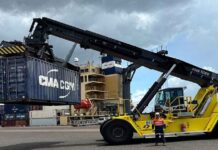AI in Supply Chain Market to Hit $22.7 Billion by 2030
AI technology is taking a new place in the bottom-up reconstruction of supply chain management in the rapidly changing global logistics and commerce world. AI, with its breakthrough analytical prowess, trend prediction of disruptions and optimization of operations, has stopped being a futuristic concept and become a realistic enabler of efficiency in the global supply chain. Latest reports reveal that AI in Supply Chain market is expected to reach a mammoth US$ 22.7 billion by the year 2030 which is an indication towards its importance to various sectors.
All this robust growth trajectory is driven by the different factors, from data analytics technology improvement to increasing use of AI tools in logistics, production and inventory management. Organizations are leveraging AI to solve perennial challenges of unproductivity, high operational expenses, and sustainability. With the help of AI, companies are not only improving the flexibility and robustness of supply chains but completely transforming the way global trade is done.
The Impact of Artificial Intelligence on Supply Chain
Recently the use of AI in Supply Chain has accelerated rapidly, with no signs of stopping. The market, valued at around US$ 6.5 billion in 2022 (according to the report by Stratview Research), is expected to register a double-digit growth of 19.3% CAGR during the forecast period of the next eight years. AI-driven solutions have become critical in scaling competitive capabilities in the increasingly demand-driven and hybrid supply chain landscape.
A leading factor behind the rise of supply chain analytics is the complexity of today’s supply chains. Today, supply networks are large, complex, connected networks that span across continents and directly or indirectly involve multiple stakeholders including manufacturers, suppliers, distributors and logistics providers. This complexity demands insights far beyond the ability of humans, and this is where the magic of AI comes into play. With the ability to analyze massive data sets in real-time, AI is enabling organizations to uncover inefficiencies, reduce risks, and respond to changing market demands more quickly and accurately than ever before.
AI adoption in supply chain management also accelerated due to the COVID-19 pandemic. As businesses struggled with significant disruptions wrought by lockdowns, workforce shortages, and shipping bottlenecks, they embraced AI-enabled tools to improve visibility across their supply chains and to inform data-driven decision-making. Even in this scenario, AI is playing a key role in enabling businesses to build resilience and continuity in a world that is ever more volatile.
AI Revolutionizing Supply Chains
The role of AI in Supply Chain management is diverse, as its effect is felt in nearly every part of the operation from procurement and production to logistics and customer service. Companies are combining AI in their supply chains for the novelty of efficiency and scalability.
Demand Forecasting and Inventory Optimization
AI demand forecasting: Demand forecasting is one of the prime applications of AI in supply chain management. Conventional forecasting methods depend primarily on historical data tend to fail in making accurate projections of future demand, particularly in turbulent markets. In contrast, AI leverages not only historical data, but also real-time variables like weather patterns, market trends and consumer behaviour to provide accurate demand forecasts. It allows businesses to adjust their inventory accordingly, which minimizes waste and prevents stockouts or overstocking.
To illustrate, as an example, global giants in retail including Amazon, Walmart, etc. are harnessing AI to help them forecast customer demand and plan their inventory strategies. They have been able to minimize the logistics costs and keep an optimal stock level, improving margin and customer satisfaction.
Predictive Maintenance & Asset Management
Another potentially game-changing value proposition are the AI powered predictive maintenance. AI systems use data from sensors built into machines, known as IoT devices, to monitor their condition and help predict equipment failures even before they happen. This enables firms to perform maintenance proactively, minimizing downtime and preventing expensive disruptions. For sectors such as manufacturing and logistics, where equipment reliability is paramount, predictive maintenance to boost operational efficiency has become a strategic imperative.
Warehouse Automation and Robotics
In terms of logistics, AI is going to power a lot of progress in warehouse automation aka robotics. Automated guided vehicles (AGVs) and robotic arms — also relying on various AI algorithms — are also frequently being deployed to optimize processes like picking, packing and sorting. Not system of these framework expanding pace and precision while simultaneously minimizing worker stronghold cutting down on workspace security. Even a report of 2025 showed that companies that invested in AI-driven warehouse automation saw an improvement in 40% of order fulfillment efficiency, thereby establishing its transformational potential.
The Time to Be Poised, Prepared and Proactive — The Time to Smooth the Transition into Sustainability and Emissions Reduction
Sustainability is now one of the top priorities for supply chain leaders, and AI is critically important for helping organizations reduce their environmental footprint. AI-powered route optimization tools, for instance, harness data on traffic patterns, fuel costs and delivery timelines to suggest the fastest shipping routes. This helps save fuel and carbon emissions, helping to make supply chain operations more environmentally friendly. Ai models are also used to find opportunities for cut down on waste, in line with sustainability initiatives.
Challenges to Overcome
While there are numerous benefits to using AI in the Supply Chain, the implementation of it can have its complications. We lack high-quality data, which is probably the most significant barrier. This AI systems rely on massive amounts of data being correct, accurate and timely in order to provide useful insights, and the lack of data availability can prevent AI from being effective. To solve this problem, organizations need to follow to invest the significant data collection and management systems.
The implementation of AI technologies Another challenge Although AI-powered solutions can potentially offer long-term advantages, the upfront cost may be significant, especially for smaller companies. With Limited Resources, Such Organizations Need to Make Balancing Decisions between Costs and Return on Investment in AI Adoption in Supply Chains
Thirdly, without professionals that specialize in AI and data science, a bottleneck arises that will make the widespread use of these technologies impossible. Managing the implementation and operation of AI systems requires specialized skills, which means companies will need to invest in training to fill the skills gap there.
The Road Ahead: A $22.7 Billion Opportunity
The rise of AI technologies is evident in the projected growth of the AI in Supply Chain market, which is expected to reach US$ 22.7 billion by 2030. With the advancing industries, the adoption of AI within the supply chain will no longer be an exception but a prerequisite. Businesses that adapt to this change will stay ahead of their competitors and be prepared to deliver value in a constantly evolving landscape.
The future of supply chain innovation — however — is less about using Machine Learning for aggregate and forecasting across multi-facility supply chains, and more about advanced new AI technologies such as natural language processing (NLP), computer vision, and generative AI unlocking game-changing possibilities. The relationship with suppliers and enable real-time decision making will solidify AI as the future of supply chain being on deck.
Ultimately, AI in Supply Chain management is not just a trend, but rather a transformation. Unleashing AI can help businesses to tackle age-old pain points, make strides towards operational excellence, and pave the path for a more sustainable and resilient future. So, with the supply chain AI market expected to hit US$ 22.7 billion by 2030, it is high time for companies to adopt AI to improve operational efficiency.






















